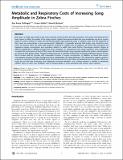Files in this item
Metabolic and respiratory costs of increasing song amplitude in zebra finches
Item metadata
| dc.contributor.author | Zollinger, Sue Anne | |
| dc.contributor.author | Goller, Franz | |
| dc.contributor.author | Brumm, Henrik | |
| dc.date.accessioned | 2014-05-08T15:31:05Z | |
| dc.date.available | 2014-05-08T15:31:05Z | |
| dc.date.issued | 2011-09-07 | |
| dc.identifier | 116767459 | |
| dc.identifier | 6152a84c-7539-4318-a517-2d6c2c23113c | |
| dc.identifier | 000294802500010 | |
| dc.identifier | 80052525386 | |
| dc.identifier.citation | Zollinger , S A , Goller , F & Brumm , H 2011 , ' Metabolic and respiratory costs of increasing song amplitude in zebra finches ' , PLoS One , vol. 6 , no. 9 , 23198 . https://doi.org/10.1371/journal.pone.0023198 | en |
| dc.identifier.issn | 1932-6203 | |
| dc.identifier.uri | https://hdl.handle.net/10023/4734 | |
| dc.description.abstract | Bird song is a widely used model in the study of animal communication and sexual selection, and several song features have been shown to reflect the quality of the singer. Recent studies have demonstrated that song amplitude may be an honest signal of current condition in males and that females prefer high amplitude songs. In addition, birds raise the amplitude of their songs to communicate in noisy environments. Although it is generally assumed that louder song should be more costly to produce, there has been little empirical evidence to support this assumption. We tested the assumption by measuring oxygen consumption and respiratory patterns in adult male zebra finches (Taeniopygia guttata) singing at different amplitudes in different background noise conditions. As background noise levels increased, birds significantly increased the sound pressure level of their songs. We found that louder songs required significantly greater subsyringeal air sac pressure than quieter songs. Though increased pressure is probably achieved by increasing respiratory muscle activity, these increases did not correlate with measurable increases in oxygen consumption. In addition, we found that oxygen consumption increased in higher background noise, independent of singing behaviour. This observation supports previous research in mammals showing that high levels of environmental noise can induce physiological stress responses. While our study did not find that increasing vocal amplitude increased metabolic costs, further research is needed to determine whether there are other non-metabolic costs of singing louder or costs associated with chronic noise exposure. | |
| dc.format.extent | 13 | |
| dc.format.extent | 608716 | |
| dc.language.iso | eng | |
| dc.relation.ispartof | PLoS One | en |
| dc.subject | Environmental noise | en |
| dc.subject | Energy-expenditure | en |
| dc.subject | Territorial bird | en |
| dc.subject | Vocal intensity | en |
| dc.subject | Urban Noise | en |
| dc.subject | Communication | en |
| dc.subject | Vocalization | en |
| dc.subject | Songbirds | en |
| dc.subject | Guttata | en |
| dc.subject | Singers | en |
| dc.subject | QL Zoology | en |
| dc.subject.lcc | QL | en |
| dc.title | Metabolic and respiratory costs of increasing song amplitude in zebra finches | en |
| dc.type | Journal article | en |
| dc.contributor.sponsor | BBSRC | en |
| dc.contributor.institution | University of St Andrews. School of Biology | en |
| dc.identifier.doi | https://doi.org/10.1371/journal.pone.0023198 | |
| dc.description.status | Peer reviewed | en |
| dc.identifier.grantnumber | BB/E003494/1 | en |
This item appears in the following Collection(s)
Items in the St Andrews Research Repository are protected by copyright, with all rights reserved, unless otherwise indicated.

